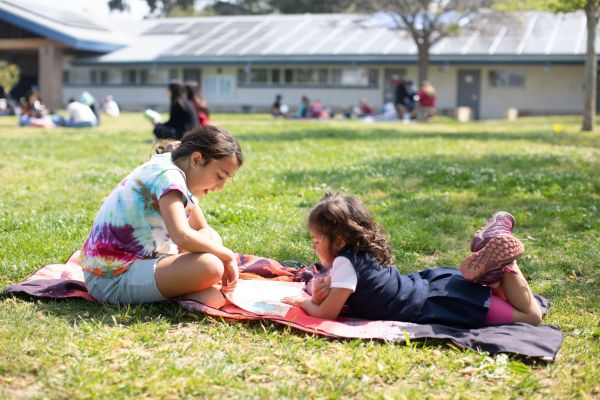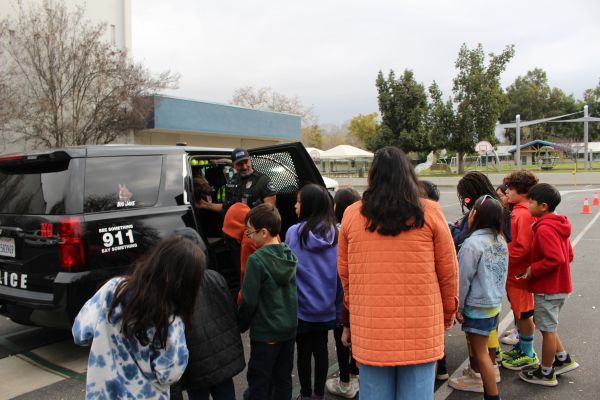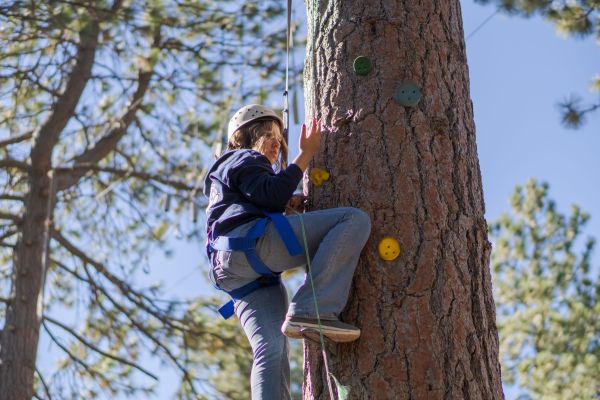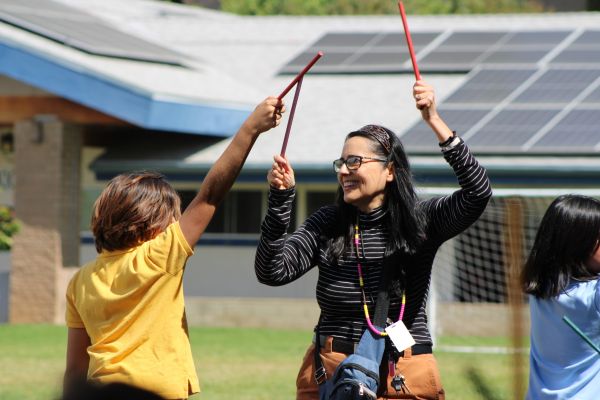
Elementary school is a crucial time for building foundational skills and fostering a lifelong love of learning in your child. At our school, we achieve these goals through a diverse range of methods that cater to the whole student, addressing their unique educational needs. With a commitment to individualized attention, our elementary classes are intentionally kept small, typically averaging 22 students per class with one or two sections for each grade. This smaller class size reflects our philosophy of prioritizing meeting each student's needs.
In our elementary program, students not only engage in core subjects like language arts, writing, math, science, social studies, and technology skills in their homeroom classrooms, but also enjoy specialized pull-out classes such as physical education, STEAM, library, and music. Additionally, they have opportunities to explore art and learn foundational stories and concepts from the Bible. This holistic approach ensures that students receive a well-rounded education that prepares them academically, socially, and spiritually for future success.
Pull Out Classes
- Library (1x per week)
- Physical Education (2x per week)
- STEAM Class (2x per week)
- Music (2x per week)


Interactive Learning
We emphasize interactive learning to engage and inspire our students. Our dedicated teachers create dynamic and stimulating classrooms where learning comes alive through hands-on activities, group projects, and interactive lessons. We believe in fostering curiosity and critical thinking from an early age, encouraging students to explore and discover concepts through experiential learning. With a focus on interactive learning, we ensure that our elementary students develop foundational skills in a supportive and engaging environment, setting them up for continued academic growth and success.

Field Trips
We recognize the value of experiential learning through engaging field trips. Field trips provide our students with opportunities to explore and experience subjects in real-world contexts, making learning come alive in meaningful and memorable ways. These experiences not only enhance academic understanding but also foster curiosity and a deeper appreciation for the world around them. Through carefully planned field trips, we aim to enrich our students' education by connecting classroom lessons to practical, hands-on experiences that leave a lasting impact on their learning journey.
.jpg/noah%202-17-23%20(20%20of%2044)__600x400.jpg)
Service Minded
We cultivate a service-minded approach to education, emphasizing the importance of empathy, community, and global awareness. We believe it's crucial for students to understand themselves, interact effectively with peers, and develop a broader understanding of the world around them. Through service initiatives and age-appropriate projects, students learn how their actions can make a positive impact, fostering hope for a brighter future. By instilling a sense of responsibility and compassion from an early age, we empower our elementary students to become caring individuals who actively contribute to their communities and beyond.

Our Teachers
Our elementary teachers excel in collective efficacy, ensuring a smooth transition from grade to grade. They effectively teach foundational skills in diverse ways that build progressively, while also imparting essential life skills such as responsibility and strategies for success. Our dedicated teachers work hard to provide students with both academic and lifelong skills, fostering resilience and the ability to handle challenges. They meet students where they are, guiding them to reach their full potential.
Elementary Curriculum

Bible
Bible Encounter Program
The Bible Encounter Program is a Seventh-Day Adventist curriculum designed to provide a comprehensive understanding of the Bible and its teachings, fostering spiritual growth and a personal relationship with God. Through biblical stories, themes, and principles, students are encouraged to apply these lessons to their lives. Using storytelling, discussions, activities, and scripture memorization, the program promotes character education and values like kindness, integrity, and respect. It helps students explore their faith, build a strong moral foundation, and become compassionate, responsible individuals.

Math
Big Ideas Math
Big Ideas Math offers a K-8 mathematics curriculum that blends conceptual understanding, procedural skills, and real-world applications. Aligned with Common Core California State Standards, it emphasizes problem-solving, critical thinking, and reasoning through a research-based approach featuring exploratory activities, direct instruction, guided practice, and digital resources. With differentiated instruction and interventions, including visual aids and collaborative learning, Big Ideas Math strives to engage and support diverse learners effectively.

Social Studies
McGraw-Hill Social Studies
McGraw-Hill Social Studies is a robust curriculum that builds students' understanding of history, geography, economics, and civics while promoting cultural awareness and civic responsibility. Using diverse instructional methods like storytelling, primary sources, maps, and digital tools, it brings social studies concepts to life. Organized into thematic units covering local to global topics, the curriculum encourages students to connect past events with current issues, fostering informed opinions and a sense of societal responsibility.

Science
By Design Science
By Design Science is a Seventh-Day Adventist curriculum offering hands-on, inquiry-based science education that integrates Bible-based principles. Aligned with Next Generation Science Standards (NGSS), it emphasizes critical thinking, problem-solving, and scientific inquiry. Students explore life, physical, earth and space sciences, and engineering through questions, experiments, and collaborative projects, fostering a deep understanding of the natural world and STEM concepts.

Writing (& more reading)
Lucy Calkins Units of Study
The Lucy Calkins Units of Study, developed by the Teachers College Reading and Writing Project at Columbia University, is a comprehensive curriculum for writing and reading workshops. It fosters writing across genres, using mentor texts and mini-lessons, while the reading component develops strong habits, critical thinking, and comprehension skills. Encouraging independent reading and discussions, the program promotes a love for reading. Its student-centered approach allows for differentiation and personalization, creating a community of enthusiastic, skilled readers and writers.

Reading
Guided Reading (Grades 1-5)
Guided reading instruction is a personalized approach to literacy that develops reading skills and comprehension in a supportive small-group setting. Students read texts matched to their level and interests, allowing for gradual progress. RAA elementary teachers offer targeted instruction and discussions to boost understanding and critical thinking. This method builds foundational reading skills and fosters a love for reading, preparing students for academic success.
Saxon Phonic (grades 1&2)
Saxon Phonics is a structured program designed to build foundational reading skills through a multisensory approach. It combines visuals, auditory, and kinesthetic activities to teach phonics concepts, with an incremental design that builds on previously learned skills. The program covers phonemic awareness, phonics, and spelling rules, focusing on letter-sound relationships, decoding, and blending. It also includes handwriting practice and dictation exercises, helping students read, spell, and write words correctly. Engaging activities like games and interactive lessons keep students motivated and enhance their learning experience.